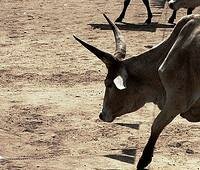Human Security and Marginalisation: A case of Pastoralists in the Mandera triangle
Issues:Competition over resources, Marginalisation
This paper seeks to bring out the relevance of human security in pastoral areas of Mandera triangle and the relationships and contradictions that exist between it and national security. The “Mandera Triangle” encompasses a tri-border region of Ethiopia, Somalia, and Kenya that exemplifies, in a microcosm, both a complex and a chronic humanitarian crisis that transcends national boundaries. The resident Somali pastoral population is highly vulnerable to periodic droughts and floods; high levels of poverty; long-term disruption to the traditional systems of livelihood; ongoing inter-clan conflicts and border tensions between states. Human security can be said to have two main aspects. It means, first, safety from such chronic threats as hunger, disease and repression. And second, it means protection from sudden and hurtful disruptions in the patterns of daily life – whether in homes, in jobs or in communities.
Violence in the Mandera triangle is often viewed narrowly as a symptom of inter-tribal conflict over cattle and other common property resources. This line of thinking is questionable given that an important issue in understanding insecurity among pastoralist groups is their distant and often oppositional relationship to the state. As with other peripheral groups, pastoralists in the region have suffered systematic marginalization by central authorities and have a history of rejecting the authority of the state, which they view as threatening to their distinct nomadic way of life. Pastoralist violence must therefore be situated, in terms of these forces of mutual opposition and exclusion as well as the struggle for control of resources. Ultimately, pastoralists do not partake in the nation’s so-called ‘public goods’. They are often denied government services and since formal legal and police services are usually nonexistent in pastoralist communities, the state seldom plays a role in guaranteeing their security. When they do become an object of state interest and intervention, it often involves forced settlement and other coercive efforts which only strengthens their resolve to remain apart.
Until rather recently there was a pronounced "blame the victim" approach in discussions about the pastoralists. The searing images from the famines of the 1970s and 1980s, much of it from the Sahel, reinforced the notion that the pastoralist was largely responsible for these immense difficulties. This understanding spurred much inappropriate development that is only now beginning to be fully understood and reassessed. The human security dimensions of the pastoralist plight are now more clearly understood as being attributable to a combination of population growth, immigration, conflict and specific government policies. Yet if we are to move beyond blaming the pastoralists, neither will simply victimising them suffice.
An adequate conceptualization of human security for Mandera triangle states and other states in Africa should ‘link human security with human development’. Economic development will have to be at the top of the institutional agenda, since development and security are ‘two sides of the same coin’. Non-state actors do not have the power to bring about large-scale development or to resolve the new security threats alone, without any state assistance. In the final analysis, studies of internationalized pastoral conflicts in Mandera triangle suggest that interest in these conflicts is justified on a number of practical grounds which have been summarized by Peter Wanyande as follows:
“First is that the conflicts are very costly to the governments and the peoples of the region as a whole and the individual countries in which they occur. The costs are in terms of loss of human life and property and the destruction of public infrastructure. Hundreds of thousands of people have been killed in many of the countries in which the conflicts occur. Many others have also suffered and continue to suffer untold psychological trauma associated with conflicts. Second, these conflicts drain the scarce resources available to the affected countries. Once conflicts occur, scarce resources are inevitably diverted to the purchase of military equipment at the expense of socio-economic development. This is not to mention the fact that the conflicts disrupt normal economic activities such as agriculture and trade. Third, the conflicts and violence they generate in any one country creates insecurity and related problems far beyond the countries in which they originate. Conflicts in the region have also caused diplomatic tensions between neighbouring countries in the region. Fifth, most of these conflicts have resulted in large numbers of refugees and displaced persons.”
This implies that states in the region must invest a substantial effort in trying to understand, and abandon the current relative indifference to, the complex interconnections between regional political instability, poverty and lawlessness.
Image source: TURKAIRO
Abdul Ebrahim Haro is an employee of Practical Action Eastern Africa (an international NGO) in the Reducing Vulnerability Programme, and is the Area Coordinator for Somali Cluster Region in the tri-border areas of Kenya-Ethiopia-Somalia. Abdul Haro has a masters in International conflicts management and is a consultant in Pastoralism and security matters in pastoral areas.
 Delicious
Delicious Digg
Digg StumbleUpon
StumbleUpon Reddit
Reddit
Posted on 4/05/11

Comments
Post new comment